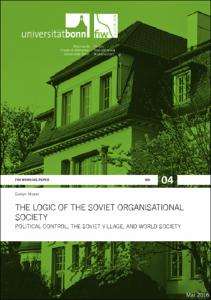Moser, Evelyn: The logic of the Soviet organisational society : political control, the Soviet village, and world society. Bonn: Forum Internationale Wissenschaft, 2016. In: FIW Working Paper, 04.
Online-Ausgabe in bonndoc: https://hdl.handle.net/20.500.11811/1148
Online-Ausgabe in bonndoc: https://hdl.handle.net/20.500.11811/1148
@techreport{handle:20.500.11811/1148,
author = {{Evelyn Moser}},
title = {The logic of the Soviet organisational society : political control, the Soviet village, and world society},
publisher = {Forum Internationale Wissenschaft},
year = 2016,
month = may,
series = {FIW Working Paper},
volume = 04,
note = {The paper describes and discusses the variant of societal differentiation that evolved under the Soviet regime. My argumentation starts with the assumption of Socialism as a program with a universal, function system-exceeding claim for validity. The implementation of the Socialist program may be perceived as an effort to create structures, which allow complete inclusion in the sense of an all-encompassing political addressability. In this regard, the political leadership tried to set up the society as a hierarchically structured organisation. The example of Soviet agriculture and the structures of Soviet villages, however, show that notwithstanding an all-encompassing degree of organisation, strictly ‘organised‘ forms of economic communication coexisted with and were interrelated to ‘unorganisable’ and even ideologically deviant forms of agricultural production by personal smallholdings. Such niches of functional differentiation did not only provide compensation for the inability of the political leadership to cope with societal complexity, but also created connectivity in the world society and could hardly be oppressed without putting the stability of the regime at risk.},
url = {https://hdl.handle.net/20.500.11811/1148}
}
author = {{Evelyn Moser}},
title = {The logic of the Soviet organisational society : political control, the Soviet village, and world society},
publisher = {Forum Internationale Wissenschaft},
year = 2016,
month = may,
series = {FIW Working Paper},
volume = 04,
note = {The paper describes and discusses the variant of societal differentiation that evolved under the Soviet regime. My argumentation starts with the assumption of Socialism as a program with a universal, function system-exceeding claim for validity. The implementation of the Socialist program may be perceived as an effort to create structures, which allow complete inclusion in the sense of an all-encompassing political addressability. In this regard, the political leadership tried to set up the society as a hierarchically structured organisation. The example of Soviet agriculture and the structures of Soviet villages, however, show that notwithstanding an all-encompassing degree of organisation, strictly ‘organised‘ forms of economic communication coexisted with and were interrelated to ‘unorganisable’ and even ideologically deviant forms of agricultural production by personal smallholdings. Such niches of functional differentiation did not only provide compensation for the inability of the political leadership to cope with societal complexity, but also created connectivity in the world society and could hardly be oppressed without putting the stability of the regime at risk.},
url = {https://hdl.handle.net/20.500.11811/1148}
}






